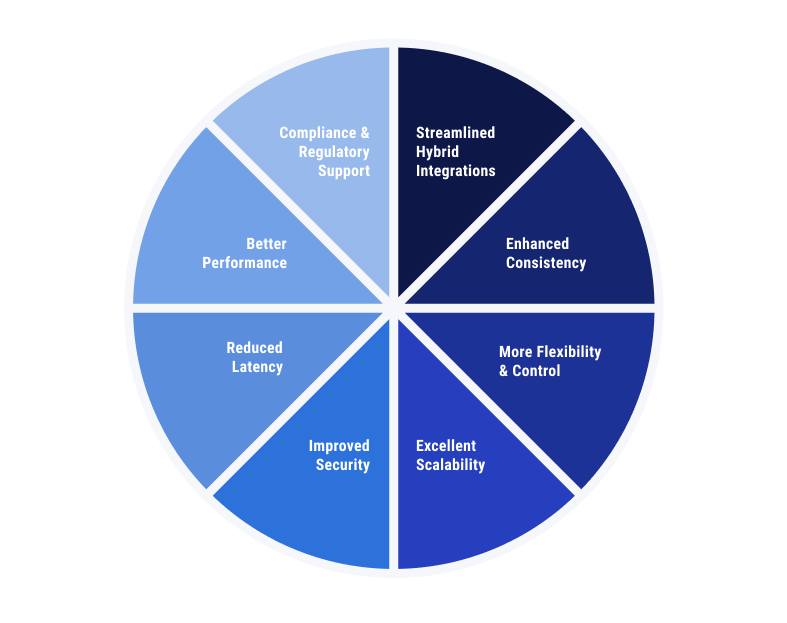
An on-premises environment can be limiting, but the public cloud doesn’t always offer the level of control some workloads require. Fortunately, you don’t need to make an either/or decision. Azure Local, previously known as Azure Stack, could offer the compromise you need.
Microsoft Azure Local offers comprehensive solutions that allow businesses to incorporate Azure public cloud services into their existing setup as part of a hybrid cloud strategy. We’ll discuss how you can use Azure Local in your hybrid cloud environment, what options are available, and the benefits businesses can enjoy after making the switch.
What Is Azure Local?
Azure Local is a software stack that organizations can use to extend Azure to their own environment. This could be an on-premises data center, a third-party managed services provider, an edge location, or a remote office. With Azure Local, businesses can leverage Azure capabilities in hybrid cloud infrastructure instead of being limited to public cloud.
This software stack leverages Azure Arc, a multicloud and on-premises management platform, as a bridge to enable seamless hybrid cloud management. Organizations can streamline and centralize their operations while maintaining the benefits of private cloud. This may be necessary when businesses need to:
- Meet specific regulatory requirements
- Process more data at the edge with low latency
- Establish a more integrated management experience
- Navigate VMware changes as licensing models shift
Azure Local offers many of the core services and capabilities of Azure, such as virtual machines, containers, storage, and networking. However, not all Azure services are available on Azure Local, and organizations may need to evaluate which services they require and whether they are supported.
What’s the Difference Between Azure Stack and Azure Local?
Azure Local replaces Azure Stack with a unified solution for the entire Azure distributed infrastructure portfolio.
The rollout of the Azure Local brand began late 2024, giving users access to the core functionality of Azure Stack HCI. This was a component of the “Azure Stack family” that combined compute, storage, and virtualization resources. Azure Local offers added flexibility, supporting disconnected operations and a broader range of hardware, deployment sizes, and Azure services.
The Azure Stack brand is being phased out. However, Azure Stack Hub and Azure Stack Edge, the other two components of the “Azure Stack family,” are still available under the same product names—now as separate solutions from Azure Local.
- Azure Stack Hub lets organizations keep their data and applications on-site while enjoying Azure services. This can be in connected mode, where the private cloud interacts with public Azure, or in disconnected mode to meet strict data residency requirements or operate on limited connectivity.
- Azure Stack Edge lets businesses run workloads at edge locations, bringing processing power closer to the data. It’s a physical appliance pre-configured by Microsoft that can support Internet of Things (IoT) devices, machine learning, or real-time processing at the edge.
However, Microsoft recommends Azure Local for most distributed infrastructure. Its extended capabilities make it a versatile, unified solution that covers the key features of the old Azure Stack suite.
Benefits of Using Azure Local for Hybrid Cloud
By leveraging the Azure Local, your business can connect your on-premises infrastructure with the Azure public cloud. This hybrid cloud approach comes with several benefits, including improved security, more integrations, greater flexibility, and enhanced performance.

Hybrid Integrations
Because Azure Local seamlessly integrates with the public Azure cloud, businesses can orchestrate and smoothly migrate workloads between on-premises and cloud environments. Enabling hybrid integrations allows for greater flexibility with workloads that introduce other benefits listed below.
Consistent Azure Ecosystem
With consistent tools, APIs, and languages available across both public and private clouds, development and application management become more streamlined processes. Azure Arc is Microsoft’s management and governance platform that extends Azure services and control beyond the Azure public cloud. This allows for the unified management of resources across on-premises, multicloud, and edge environments.
With Arc, IT leaders get Azure Local functionality while bringing Azure’s control plane, including policy enforcement, role-based access control, security, monitoring, and governance, to any infrastructure, whether it’s:
- On-premises servers and virtual machines
- Kubernetes clusters running anywhere
- Databases hosted outside Azure
- Hybrid setups using Azure Local or Azure Stack Hub
- Resources running in AWS or Google Cloud
Flexibility and Control
Azure Local provides organizations with significant flexibility and control, enabling seamless integration of private and public cloud environments. This combination allows teams to dynamically adjust resources based on workload demands while retaining authority over their infrastructure. This also enables customers to leverage more cloud-native tools.
Organizations can customize resource management, allocation, and security settings, leading to enhanced cost optimization and improved data protection. The ability to leverage both environments strategically empowers organizations to respond quickly to changing business needs while maintaining compliance and governance.
Scalability
On-premises solutions are difficult to scale. Azure Local and public Azure cloud can enable easier resource scaling for organizations that still want to retain on-premises workloads. However, it is important to remember that there are still limits to underlying hardware and infrastructure capacity, so businesses must carefully plan their configurations with Azure Local to ensure they can meet future scalability needs.
Improved Security
Hybrid solutions, like ones incorporating Azure Local, can enhance security with failback mechanisms and built-in redundancy. In the event of a cyber threat or service interruption, this architecture allows you to leverage multiple layers of protection.
Azure Local in particular supports Azure Site Recovery with replication, failover, and recovery processes that keep apps running during outages. Azure Backup can also protect your on-premises data. Additionally, security policies and protocols can be tailored to specific needs, helping organizations ensure better data protection and compliance across environments.
Reduced Latency and Enhanced Performance
If you’re looking for greater performance and lower latency in edge deployments, Azure Stack Edge enhances real-time responsiveness. Similarly, Azure Local has strong processing capabilities for latency-sensitive workloads. This can be beneficial for businesses looking to improve performance at the edge for end users, including retail establishments, organizations that leverage Internet of Things (IoT) devices, and transportation companies that require real-time fleet management.
Compliance and Regulatory Support
Azure Local can also help businesses meet data residency requirements by keeping data and applications local, while still allowing for the benefits and tools that come with Azure. It can also support compliance with industry regulations concerning data management and privacy. Azure Local can offer regulatory support for the most sensitive workloads.
Ready to Incorporate Azure Local into Your IT Systems?
Integrating Azure Local into your IT infrastructure can transform your hybrid cloud strategy by seamlessly connecting your systems with Azure’s public cloud services. Relying on TierPoint experts for the integration of software and hardware guarantees a smooth transition, and once you have Azure Local implemented, you can enjoy a unified development environment, streamlined operations, and enhanced scalability.
Need help optimizing your hybrid cloud strategy with Azure Local? Contact TierPoint today to learn how our Managed Azure Local services can help you achieve seamless integration and enhanced performance.

FAQs
Azure Local is full-stack infrastructure software that allows organizations to use Azure services in on-premises environments
Azure Local solutions can be used to modernize applications without a complete migration to the public cloud, optimize production processes with real-time data, run local applications at remote branch offices, and run demanding, high-performance workloads, among other things.
